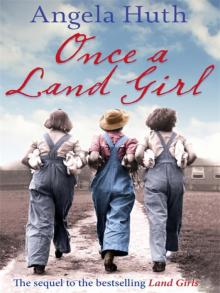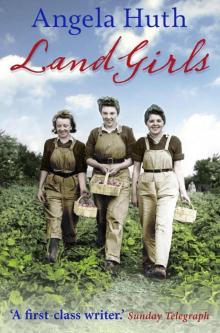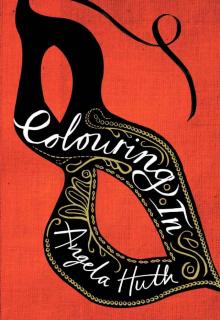- Home
- Angela Huth
Monday Lunch in Fairyland and Other Stories Page 2
Monday Lunch in Fairyland and Other Stories Read online
Page 2
‘All this and I’m wearing the wrong things?’ he said.
‘Of course not,’ said his mother, quickly. ‘You’re lovely and smart, Loaf, take it from me.’
‘But all the others’ll be in jeans and tee-shirts,’ said Gracie.
‘Then Loaf will be much better turned out,’ replied her mother. ‘Now, you’d better be getting along.’
Pa drove them in his old car. Loaf sat in the back, brushing the seat with his hand before he got in. He didn’t speak, but loosened his tie a little. Gracie chattered excitedly to Pa. When they arrived at the village hall, and got out, Loaf remembered about his head and held it up for a while.
Inside the hall an explosion of sound unleashed the sweat glands in his body. The wetness he had been dreading arrived with startling suddenness: with each new blast from the band the dampness spread, from arms to feet, to face to spine; it even trickled down his legs. Unnerved, Loaf put his big hands to his ears, then caught someone looking at him, so smeared his gesture into one of casualness, as if he was merely rubbing them.
He looked round for Gracie. She was already gone. He couldn’t see her.
‘Excuse me, you’re blocking the door.’ Someone had pushed him. There seemed to be so much room. It puzzled him he could be in the way. He moved.
As he walked away to a row of empty chairs by a wall he felt his head jerk in time to the music: he couldn’t control it. When he sat down, he gave in and let it loll to one side. Sideways, he looked about him. The hall had been decorated for the occasion. A solitary string of coloured lights was strung across the ceiling. Paper roses were pinned to the glittery curtains drawn across the high-up windows, and posters of pop-stars were stuck here and there on the shabby green walls. Loaf thought it looked very nice.
He turned his head to the band on the stage. It consisted of four very small, thin young men with long hair and scarlet hearts painted on their cheeks. They wore identical pink satin shirts, and winced and swayed as they clutched at their instruments, as if the wood and strings were hurting them. One of them was singing. Loaf couldn’t catch the words. The voice was a shrieking groan that struggled to surmount the music. But the frenzy of their massive sound was successfully transmitted to the dancers. Forty or fifty young things, all in bright clothes and no ties, were springing about with a wild rhythm, their eyes rolled up to the coloured lights, every part of their bodies rippling with the music. Loaf watched their fast, skilful feet for a long time, then shuffled one of his own, so gently no one would notice, under the chair.
He caught sight of Gracie. She was the prettiest and best dancer in the room, definitely. People were looking in her direction. The man opposite her, to whom she seemed to be directing her sinuous movements, was the only one who had his eyes shut. He looked a decent enough sort of guy, Loaf thought, but with his eyes screwed up like that and his head thrown back, he, too, might have been in pain. Then Loaf noticed a message on the man’s tee-shirt. F**k me, it said. Loaf felt the hot dampness beneath his heavy clothes again. He stood up, head jerking. He’d have to rescue Gracie somehow, or he’d never hear the end of it from Pa.
He walked round the edge of the room, careful not to get in anyone’s way, to a point where he thought Gracie, if she looked, would see him. For a moment she glanced in his direction.
‘Gracie,’ he said. But perhaps she didn’t notice him, because she didn’t stop dancing. Obviously she couldn’t hear him. Loaf lifted one of his hands, looked at it, then waved it at her. She still didn’t see. She was laughing at the man with the shut eyes, and stamping her skinny legs so that her skirt flew high. There was nothing left for Loaf to do, other than go over and drag her off the floor, and he’d never do that, not for anything. Maybe she’d be all right so long as he kept watching her. So long as he didn’t let her out of his sight. If anyone tried to lay a finger on Gracie he’d bash them over the head, in the stomach, everywhere, till they were unconscious.
He bought himself a Coke and a cheese sandwich from a long table covered with drinks and food. He took them back to another empty chair, further from the band, and settled himself to watch Gracie. As the music ripped painfully through his head, and the dancers confused his eyes, he thought how nice it would be to be able to go home and say to Mother and Pa in the morning how much he’d enjoyed it all. How much he’d liked the music and the dancing. How nice it would be, too, he thought, if they really were Mother and Pa, if he was their real son like Gracie was their real daughter. He didn’t have such thoughts very often, just sometimes when things went badly, when Pa shouted at him and he forgot to do something he’d meant to do for Mother. Then, for a few days, he’d find himself looking about more carefully: looking out for a very tall old man who just might be his real father, and a woman with very whitish hair, like his own, who could be his mother.
Gracie was coming towards him, her body still wriggling with the music, followed by the man whose eyes were half-open now.
‘Stop staring, can’t you?’ she shouted. ‘Your eyes always on me gives me the creeps.’
Loaf blinked. He wanted to say he was unaware he’d been staring and he was sorry if he’d annoyed her. But the man put his hand on her shoulder and pushed her away. They went towards the food table. Loaf stood up, watching them. He felt himself shaking. He saw Gracie point to the gin. The man poured her a glass and added orange. Gracie wasn’t allowed gin. If Pa knew Gracie was drinking gin there’d be a row all right. He moved towards the table and almost at once got in the way of some dancer.
‘Mind out, Loaf the oaf,’ shouted the swaying girl, and laughed at the hirsute man dancing opposite her.
Loaf dodged out of her way, looking at her. Familiar face. Chemist shop – that was it, the girl in the chemist shop who’d made a rude joke when his mother had sent him to buy a laxative. Remembering, he blushed.
He sat down again, nearest chair he could find, gripping on to his empty Coke bottle with both hands. With a jerk of his head he saw Gracie and her man leave the hall, carrying their drinks. He swallowed, searching for moisture in his mouth, and looked at his watch.
He looked at his watch again two hours later when Gracie returned, alone. By now the evening was almost over. The satin shirts were packing up their instruments. The new quietness of the place had left Loaf feeling weak, and still he sweated. Gracie came up to him, perky as anything.
‘We off, then?’ Gracie was flushed, pleased with herself.
‘Oh yes, if you want.’ He didn’t want to be any further nuisance to her. He wanted her to have her own way now, to make up for his staring.
‘Come on, then. Derek’s gone. He offered me a lift on his bike, but I said no, Pa’d do his nut.’ Swing, swing, swing she went, towards the door in front of Loaf.
Outside it was still warm and airless, a faded summer night with a cloudy moon. Bikes revved up, white arms shuddering on handle-bars, shiny girls on the back seats squealing to each other.
‘Wish I could have gone with Derek,’ Gracie said.
‘Sorry,’ said Loaf.
They walked down the quiet road between tall black hedges. Soon as they were out of sight of the hall Gracie took Loaf’s arm. He couldn’t remember her ever having touched him before.
‘Quite gives me the spooks, the dark,’ she said. ‘Doesn’t it you?’
‘No,’ said Loaf.
‘The spooks . . .’ She drew out the word, then gave a shriek. ‘Ooh my God, there’s a shadow moved, Loaf.’ Her hand tightened on his arm.
‘It’s nothing, really.’ Loaf was pleased to be able to reassure her. He looked down at her. He smelt gin. She seemed a little unsteady on his arm.
‘You been drinking?’
‘We had a couple. Gin and orange, my favourite drink. The gin brings out the taste of the orange, Derek says. He’s right, mind.’ She giggled. ‘Did you notice Derek? I think he’s smashing. Very gentle.’ She was quiet for a while. ‘He kissed me, you know. He wanted to go on, but I said no. I said you mustn’t do that Der
ek, or we’ll go too far.’ Loaf felt her small body stiffen.
‘God, I wanted to go too far,’ she said.
‘Did you?’ said Loaf.
They were walking very slowly now. The farm buildings were in sight. They walked the rest of the way in silence. There was a quiet stir of animals in the farmyard, the sudden darting flight of a bat, a smell of warm manure, and tobacco plants that grew by the barn. An owl hooted.
‘Jesus, that scared me,’ said Gracie. She stopped, forcing Loaf to do the same. ‘You’re brave,’ she said. ‘So brave you’d dare come with me into the barn for a fag.’
‘A fag?’
‘Derek slipped me one. You wouldn’t tell Mother and Pa, would you? But Christ, I’m dying for it. I daren’t smoke it in my room. Pa’d smell it out and do his nut.’
‘We wouldn’t want to set the barn on fire,’ said Loaf, slowly.
‘We wouldn’t do that, silly.’ Gracie broke away impatiently from Loaf and started towards the barn. ‘We’ll take great care.’
Loaf followed her, half flattered, half afraid.
The barn rustled, full of dark shadows and warm musty smells of clover hay. They sat on a bale of straw. Gracie lit her cigarette and puffed smoke at the doorway, a dim square of sky in which the moon floated halfway up.
‘Wouldn’t like to spend a night in here alone,’ she said. ‘I’d be dead scared.’ She passed Loaf her cigarette. ‘Have a drag.’ Loaf shook his head. ‘Go on, be a devil.’ Loaf shook his head again.
Gracie sighed. ‘I don’t know what you do like,’ she said. ‘I sometimes wonder what goes on in your head, what turns you on.’ She shifted herself a little. One of her legs touched his. He didn’t move, frightened of annoying her. ‘What really gets you?’ she asked.
‘I like going up the hills with my stick,’ said Loaf. ‘I like beating the bushes so’s the butterflies come out.’
Gracie gave a small laugh. ‘Big deal,’ she said, eventually.
‘Probably sounds silly,’ said Loaf, ‘but you did ask.’
Gracie leaned back, supporting herself on the bale behind them. She took another long draw at her cigarette, carefully watched the smoke filter up into the darkness. ‘And mind the ash, for Pete’s sake,’ Loaf added. His limbs felt suddenly tight.
‘I’m not a fool, Loaf.’ Gracie sounded languid, slow. Not at all her normal pert self. ‘D’you like sex?’ she asked.
‘Sex?’ Just saying the word sent a quiver down Loaf’s back.
‘What d’you think of it?’
Loaf hesitated. ‘I’m not sure.’
‘Go on.’ Grace laughed again, kindly. ‘Have you ever had it?’
‘Had sex?’ The quiver again.
‘You’re being awfully dumb. You can tell me. Go on.’
‘Well, I suppose, not exactly with anyone.’
Gracie sat up, interested. ‘That way it must be awfully boring.’ She nudged him. ‘Aren’t you dying for it with someone?’
Loaf looked at her.
‘I am,’ she said.
In the deep brown light her pinkness was mottled with shadows. She was warm and smelt of gin. Her lips shiny, her hair tangled prettily. Loaf was unable to move. Ever since she had been a small child Gracie had been able to exercise a carotic effect upon him, though never so strong as now.
‘Yes,’ he said, after a while.
Gracie shifted again. Her leg was touching his on purpose now.
‘D’you think I’m sexy, Loaf? Derek does. He said he knew what he’d like to do to me all right.’
A strange havoc raged in Loaf’s loins.
‘If you’ve finished your cigarette, I think we’d better go in.’ He felt his voice to be unsteady.
‘Here. Your responsibility.’ Gracie handed him the stub. He flicked it out of the door, glad to have something positive to do. Hand very weak.
‘You ever seen a girl undressed?’ Gracie was lying back again now, legs a little apart. Loaf studied her small sharp child’s knee. He clasped his hands together to protect himself from touching them.
‘No,’ he said. He paused. ‘Did you hear me? I said I thought we should go in.’ He felt her hand on the back of his neck.
‘Wait a tic, Loafy. I’ll show you.’
Loaf tried to get up. Instead he turned to her.
She had pulled her jersey out of the skirt. It was gathered up under the chin, leaving her breasts triumphantly bare: firm, pale, two perfect round shadows at their centre, quite still, while the barn shadows trembled around them. Loaf looked, and looked.
‘Go on, touch them. Do you good.’
‘I’m your brother, silly. Gracie . . . come on.’
Gracie put a hand on his arm. ‘Brother, phooey. Only in name.’ Child’s voice once more, sulky, wheedling. ‘See if I can’t turn you on. Promise I won’t tell.’
‘Pa’d do –’ Loaf was up from the bale, free from her, head high in the darkness, running, breaking through the green square of sky, feeling the familiar catch of the back door under his fingers . . . The stairs, then, two at a time – the noise, never mind the noise . . .
He threw himself on the bed. His heart battered at his ribs, his trousers strained round the crotch, his whole body was clammy. He closed his eyes: darkness replaced by a million scarlet chips, spinning, spinning. You’ll pay for this, Gracie, with your airs and graces. . . The words a banner in his head. He groaned out loud.
Loaf lay quite still for some time. He had no energy to get up, undress, put on the light, get into bed. Only a different kind of energy within him, disturbing, wakeful, prowling his blood, weakening him.
His door opened gently. He reached up and switched on his bedside light. He knew it was Gracie. You’ll pay for this Gracie. . . The interval without her had given him time to muster a little of his reasoning.
She stood there, defiant, beautiful, in a blue dressing gown. Make-up still on, but stick legs bare now. Bare feet, too. She closed the door behind her.
‘Sorry,’ she said. Loaf swung his legs on to the floor.
‘You must go back to bed, Gracie,’ he said. The words were difficult. ‘You must. You must, Gracie . . .’ Looking away from her, he knew his head had lolled to one side.
‘I know I must.’ She giggled. ‘It’s just – I didn’t want to go with you so mad at me. And I was feeling so – you know. I couldn’t help it. I should’ve gone home with Derek.’
‘Go, now,’ said Loaf.
‘Yeah, all right.’ She opened her dressing gown. ‘Just thought you’d like a look at all of it before I do.’
Loaf jerked up his head. The scarlet chips, blasting his eyes again, crowded the slice of her body that the dressing gown exposed. They gathered, crazed, round her breasts and stomach, darkening as his eyes lowered. Then she ran towards him.
‘I’m not revolting, am I?’ she screamed. ‘Why won’t you touch me?’ She threw herself upon him so that for a moment he felt her soft warm flesh against his face, his hands. He pushed her from him, lifting her up as he did so. She weighed no more than a large box of apples. When her feet reached the floor again he supported her crumpled body, watching her sway. Then he hit her, heavily, on the side of her face.
‘You little . . .’ No word came. He watched her fall. She screamed. The noise was a profound exacerbation in his soul, causing his skin to contract, to go cold. He looked at her, lying on the rug, face down, dressing gown covering the bony little back. Breasts too heavy for those bones perhaps . . . She began to cry. Perhaps that’s why she was crying. A child’s noise. Loaf had forgotten she was a child. Forgotten why he hit her.
He looked up to see the door had opened. Mother and Pa stood there, Pa first, in old woolly night things. Faces askew.
‘What happened?’ Pa was at once kneeling beside Gracie. Loaf whimpered. Tomorrow, they’d send him away. Maybe tonight.
‘What happened, child?’
‘I don’t know. Loaf . . .’ Gracie was sobbing badly. Mother looked down at her, severe, drawn beig
e mouth.
‘Best carry her to her room, Pa,’ she said.
Pa picked the child up, averting his eyes as he wrapped the dressing gown over her nakedness. He carried her out of the room.
Loaf hung his head, listening to her diminishing cries. He could feel his mother’s eyes searching him, silent. He could see her hands kneading the clotted wool of her night-gown. She had brought a powdery, angry smell into the room.
‘I didn’t . . .’ he said. ‘I’ll go in the morning. Pack my bags.’
‘Look at me, Loaf.’ Loaf raised his head. Mother’s eyes, always small, were shrunk with tears that gave them an extra skin, but the tears stayed poised where they were, no signs of overflowing. He’d never seen her like that before.
‘She’ll have to be the one to go,’ Mother was saying. ‘We’ve had this trouble before, Loaf, so many times. Didn’t you understand? Had you no idea?’
‘I’ll go,’ Loaf persisted. ‘I’ll be the one. Gracie’s your real daughter.’ The words all rushed.
‘I said: don’t you understand, Loaf? Others . . . many others in the village. Complaints at school. Why do you think I asked you to go with her to the dance, to take special care of her? She’s fourteen.’
Loaf found his mother’s quiet words beating themselves into a pattern in his head. A shape he was beginning to understand, though not believe.
‘What’s the matter with her?’ he asked.
Mother hesitated. Chose her words carefully. ‘She’s very precocious. But we thought at least with you, her brother –’
‘But I’m not really her brother, am I?’ New confusion: the chips gathering again in his eyes.
‘I’m not, really . . . you know I’m not.’
He remembered quite clearly Gracie saying that in the barn, lying back, lying back. He’d always known.
Mother turned, eyes dried out and larger, neck pulled high.
‘It’s how we think of you, Loaf,’ she said, and left the room.
They sent Gracie to a special school, far away, and Loaf continued his work on the farm. But since the dance an increasing listlessness came over him. He found it hard to concentrate on the simplest job. Pa snapped at him, doubly confusing him, and Mother seemed to notice him less than was her custom. From time to time he begged them to let Gracie come back. It was his fault, he said, and he didn’t like to see her punished. But they wouldn’t listen, said they didn’t want to talk about her. She was ill, was all they would say: better get her cured while she was young.

 Sun Child
Sun Child South of the Lights
South of the Lights Virginia Fly is Drowning
Virginia Fly is Drowning Of Love and Slaughter
Of Love and Slaughter Such Visitors
Such Visitors Once a Land Girl
Once a Land Girl Land Girls
Land Girls Colouring In
Colouring In Nowhere Girl
Nowhere Girl Monday Lunch in Fairyland and Other Stories
Monday Lunch in Fairyland and Other Stories Another Kind of Cinderella and Other Stories
Another Kind of Cinderella and Other Stories Invitation to the Married Life
Invitation to the Married Life Easy Silence
Easy Silence